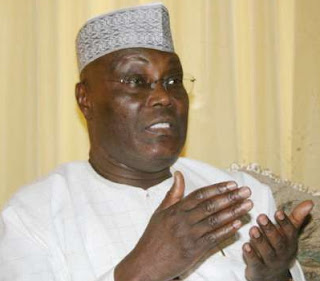Crime News
How US Banned Atiku Over Corruption And Money Laundering

December 4, 2017 – How US Banned Former Nigerian Vice President Atiku Over Corruption & Money Laundering
Ex-Vice President Atiku Abubakar may have stirred the hornet’s nest with his interview with The Boss newspaper on why he has been unable to visit the United States (U.S.). He believes the reasons for denying him visa into the U.S. can only be explained by the U.S. government. But excerpts from a report however contradict Abubakar’s claim.
In an interview with The Boss newspaper, published Saturday, former Vice-President Atiku Abubakar stirred anew issues about his being barred from entering the United States (U.S.) and his being once denied a visa.
He further complicated matters when he alleged that President Muhammadu Buhari was barred from the U.S. for 15 years, until 2015, a claim that was promptly debunked by the President’s handlers as ‘fictive concoction’.
At the moment, there is no known indictment filed against the former Nigerian leader in any U.S. court, seven years after a Senate Report detailed money laundering activities against him, including being a recipient of a bribe by Siemens. Also, U.S. diplomats in Nigeria, have been dodgy declaring his status.
His political opponents had challenged him and even taunted him several times to go to the U.S. on a visit, to test whether he is wanted for any financial crime. He is yet to take up the challenge as he brews another controversy.
What is known is that Abubakar was the subject of a probe 10 years ago, by a U.S. Senate Permanent sub-committee on Investigations, chaired by Senator Carl Levin.
The probe was motivated by U.S. government concern about corruption in the Third World and its corrosive effects on the development of honest government, democratic principles, and the rule of law.
“It is also blamed for distorting markets, deterring investment, deepening poverty, undermining international aid efforts, and fostering crime. Some have drawn connections between corruption, failed states, and terrorism. Corruption also continues to be a massive problem. The World Bank has estimated that $1 trillion in bribes alone exchange hands worldwide each year,” the committee noted in its bulky report.
Abubakar was not the only foreign Politically Exposed Person (PEP) probed by the committee. He had company in Teodoro Nguema Obiang Mangue, now the 48-year-old son of Teodoro Nguema Obiang Mbasogo, the President of Equatorial Guinea (EG), late President of Gabon, Omar Bongo and three Angolan PEP accounts, involving an Angolan arms dealer, an Angolan government official, and a small Angolan private bank.
The committee submitted its report on 4, February, 2010, three years after Abubakar left office.
The report unveiled violations of U.S. laws by Abubakar and his fourth wife, Jennifer Douglas. It also included revelations about Siemens bribe paid into one of the accounts, and it possibly provided the basis for Abubakar being barred from entering the United States, since then.
This Report examines how politically powerful foreign officials, their relatives, and close associates – referred to in international agreements as Politically Exposed Persons (PEPs) – have used the services of U.S. professionals and financial institutions to bring large amounts of suspect funds into the United States to advance their interests. Using four case histories, this Report shows how some PEPs have used U.S. lawyers, real estate and escrow agents, lobbyists, bankers, and even university officials, to circumvent U.S. anti-money laundering and anti- corruption safeguards. This Report also offers recommendations to stop the abuses.
Summary of the report on Abubakar case history
From 2000 to 2008, Jennifer Douglas, a U.S. citizen and the fourth wife of Atiku Abubakar, former Vice President and former candidate for President of Nigeria, helped her husband bring over $40 million in suspect funds into the United States through wire transfers sent by offshore corporations to U.S. bank accounts.
In a 2008 civil complaint, the U.S. Securities and Exchange Commission alleged that Ms. Douglas received over $2 million in bribe payments in 2001 and 2002, from Siemens AG, a major German corporation.
While Ms. Douglas denies wrongdoing, Siemens has already pleaded guilty to U.S. criminal charges and settled civil charges related to bribery and told the sub-committee that it sent the payments to one of her U.S. accounts.
In 2007, Mr. Abubakar was the subject of corruption allegations in Nigeria related to the Petroleum Technology Development Fund.
Of the $40 million in suspect funds, $25 million was wire transferred by offshore corporations into more than 30 U.S. bank accounts opened by Ms. Douglas, primarily by Guernsey Trust Company Nigeria Ltd., LetsGo Ltd. Inc., and Sima Holding Ltd.
The U.S. banks maintaining those accounts were, at times, unaware of her PEP status, and they allowed multiple, large offshore wire transfers into her accounts. As each bank began to question the offshore wire transfers, Ms. Douglas indicated that all of the funds came from her husband and professed little familiarity with the offshore corporations actually sending her money.
When one bank closed her account due to the offshore wire transfers, her lawyer helped convince other banks to provide a new account. In addition, two of the offshore corporations wire transferred about $14 million over five years to American University in Washington, D.C., to pay for consulting services related to the development of a Nigerian university founded by Mr. Abubakar.
American University accepted the wire transfers without asking about the identity of the offshore corporations or the source of their funds, because under current law, the University had no legal obligation to inquire.
Executive Summary
Combating corruption is a key U.S. value and goal, due to its corrosive effects on the rule of law, economic development, and democratic principles. In 2001, the Patriot Act made the acceptance of foreign corruption proceeds a U.S. money laundering offense for the first time, and required banks to apply enhanced scrutiny to private banking accounts opened for senior foreign political figures, their relatives, and close associates. In 2003, the U.S. supported the United Nations Convention Against Corruption, now ratified by over 140 countries. Also in 2003, U.S. Immigration and Customs Enforcement (ICE) formed an investigative group dedicated to combating foreign corruption by PEPs. In 2004, President Bush issued Presidential Proclamation 7750 denying U.S. visas to foreign officials involved with corruption, and Congress later enacted supporting legislation. A 2009 study sponsored by the World Bank analysed PEP controls worldwide and recommended stronger measures to reduce corruption.
The Permanent sub-committee on Investigations (sub-committee) initiated this investigation to learn how U.S. laws apply to PEPs utilising the domestic financial system, and examine how foreign senior political figures, their relatives, and close associates may be circumventing or undermining anti-money laundering (AML) and PEP controls to bring funds that may be the product of foreign corruption into the U.S.. It is the latest in a series of sub-committee hearings examining foreign corruption and its U.S. aiders and abettors.
During the course of its investigation, the sub-committee staff conducted over 100 interviews, including interviews of lawyers, real estate agents, escrow agents, lobbyists, bankers, university professionals, and government officials. The sub-committee issued over 50 subpoenas and reviewed millions of pages of documents, including bank records, correspondence, contracts, emails, property records, flight records, news articles, and court pleadings. In addition, the sub-committee consulted with foreign officials, international organisations, financial regulators, and experts in anti-money laundering and anti-corruption efforts.
[Report By Mojirade Ojo]








































Jamiu Ednut
December 4, 2017 at 11:10 PM
I said it before this guy is only interested in looting Nigeria. If he wins, he will loot more than late Abacha.His selfish interest is te motivation behind his return to PDP but God will not let him win
iron bar
December 5, 2017 at 12:20 AM
NO.HE WILL SELL THE NATION JUST LIKE HOW A YAHOO MAN SOLD LAGOS LAGOON RECENTLY..ATIKU IS A HUGE JOKE
DB
December 5, 2017 at 7:20 AM
Iron bar, u took d word from my mouth. He will just sell Nigeria